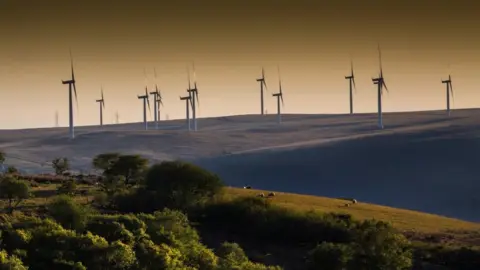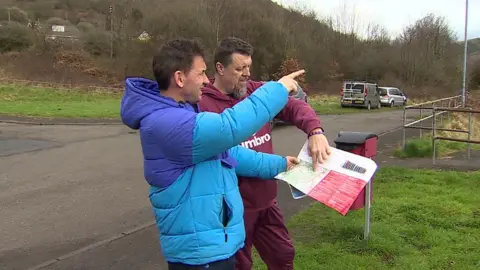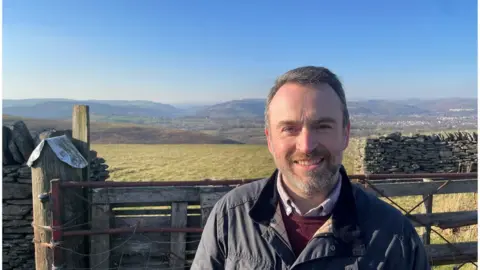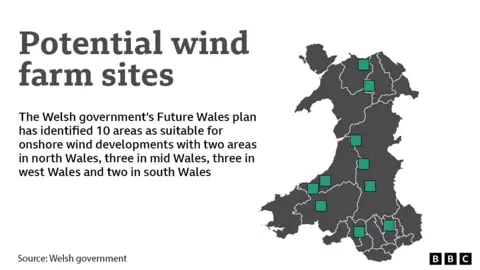Climate change: Opposing wind farms morally unacceptable - expert
 Getty Images
Getty ImagesCommunities opposed to wind turbines in their local area do not have an "acceptable moral position" according to a climate change expert.
Dozens of large-scale wind farm applications are being considered as Wales tries to reach net zero.
Campaigners say the ambition is putting the Welsh countryside at risk and south Wales already has several wind farms.
Lord Deben, the UK Climate Change Committee chairman, said the onus was on everyone to help reach the target.
"We can't all the time say we're in favour of things but somewhere else," he said.
"That isn't an acceptable moral position."
Across Wales communities are mobilising to object to wind farm and pylon developments in their areas.
From Conwy to Carmarthenshire, across mid Wales and the south Wales valleys, hundreds of campaigners are sharing information and ideas about how to fight what they call "colossal" turbines.
In Cwmafan, Neath Port Talbot, Rhodri Williams and Andrew Thomas said in lockdown the hills above their town were a sanctuary, but that peace is at risk from a proposed plan to build 21 turbines which will be visible from their homes.
"At over 200m (656ft) we're talking around the size of the Eiffel Tower," said Mr Thomas.

"That's absolutely colossal. If you stand at the foot of the Eiffel Tower and look up and then you imagine that on top of a mountain range that is already 350m (1,148ft) above sea level. "
Mr Williams is concerned about the impact on people's health and the environment and says he would rather they were offshore.
'Doing our fair share'
"We don't need these, there are plenty of alternatives. It causes a lot of grief and stress for those who live near them and we should be looking at alternatives like hydro, we should be looking at floating offshore wind, and the tidal lagoon in Swansea," he said.
"There are over 200 wind turbines in south Wales already, we're doing our fair share."
But according to the chairman of the UK's independent Climate Change Committee, Lord Deben, it is not "proper" to say other places should shoulder the burden for tackling climate change.
"I think every community has to say to itself, 'if we don't have this what are we going to have?'
"We can't all the time say we're in favour of things but somewhere else. That isn't an acceptable moral position," said Lord Deben.
He added that people could not expect others to carry the cost of net zero without doing something themselves.
The Welsh government's Future Wales plan has identified 10 areas as suitable for onshore wind developments - two in north Wales, two in south Wales and six in mid and west Wales.
Applications for wind farms will not be automatically approved for these areas, according to the policy, but there is a presumption large-scale wind energy developments will secure planning consent.
Developer Bute Energy has submitted plans for four wind farms - one in Conwy county, two in Powys and one on the border between Caerphilly and Rhondda Cynon Taf council areas.

It hopes to connect the projects in Powys to the grid using a network of pylons stretching to Carmarthen as current grid capacity in mid Wales is insufficient to meet future demand, according to a report by a group of Welsh MPs.
The projects have proved controversial with concerns being raised about their size and proximity to people's homes.
Aled Rowlands, the company's director of external affairs, said the firm was listening to the concerns of local people.
The majority of people support and understand the need for a transition to renewable energy, he said, but that transition will inevitably mean more infrastructure like pylons to improve the current grid capacity.
"It's very important that society now says what it wants and what is acceptable in order for us to be able to get to net zero, to be able to use clean, green energy," said Mr Rowlands.
'Gold rush'
According to the Campaign for the Protection of Rural Wales (CPRW), there is a "gold rush" for net zero, and the number of "unsuitable applications" for turbines over 200m (656ft) high and pylons across rural Wales is causing concern in many communities.
Dr Jonathan Dean from CPRW's Anglesey branch said the number of recent applications and the alarm they were causing in those areas is unprecedented.
"I've lost count of the number of projects, it's like a gold rush. I've got big concerns [over whether] that it is a good policy, that it is a fair policy.
"I'm concerned for communities who are battling against them [like] David and Goliath," he said.
The charity favours using offshore wind to reach, and exceed our net zero goals, but one expert in renewable energy warns against putting our eggs in one basket.
Professor of renewable energy in the school of engineering at Cardiff University, Nicholas Jenkins, said that to decarbonise the whole of the UK economy by 2050 and the electricity supply by 2035, all of the options need to be available.

Wales wants to reach net zero by 2050 and wants to meet 100% of its electricity needs from renewables in 12 years' time.
Prof Jenkins warned that focusing on offshore wind and small modular nuclear reactors, at the expense of onshore wind, is a "risky strategy".
"I think it's really questionable whether the required amount of generating capacity can be delivered in time," he said.
A Welsh government spokesperson said: "We need a range of technologies, at different scales, to meet our future electricity needs as we move towards a net zero energy system. Wind and solar are cost-effective options to generate electricity and have a clear role to play.
"We want to ensure local communities and people in Wales directly benefit from energy generated in Wales. We are taking action to support local and shared ownership and developing strong, local supply chains."
